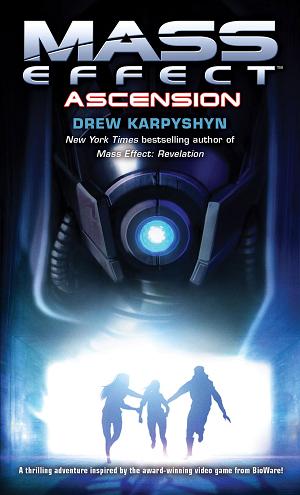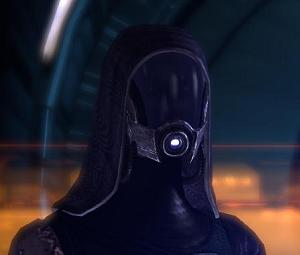Book Review: Mass Effect: Ascension
 | | Mass Effect: Revelation |
[WARNING: There are minor spoilers in this review.]
While a devastated galaxy attempts to put the pieces back together following a brutal attack at the very heart of interstellar government, a shadowy group called Cerberus is busy working behind the scenes to ensure that humanity not only rises to the occasion but grows powerful enough to rule over all. One of their pet projects is a girl named Gillian Grayson, an incredibly powerful biotic with a severe developmental disorder. Cerberus has planted Gillian in the Ascension Project, a scientific program that helps gifted children control their powers, and when things start getting out of control there, they send Gillian's adoptive father, one of their trained assassins, to retrieve her.
The sequel to Mass Effect: Revelation picks up shortly after the events of the video game and purports to set the stage for the upcoming Mass Effect 2. It is immediately apparent that this book, Mass Effect: Ascension, is much like the previous book, in that the story is tangental to that of the video game. However, there are plenty of differences between the two works.
Most importantly, the characters are much stronger. Where the characters in Revelation were flat and all thought the same way, the various characters in Ascension have more dimensions and depth. The various points of view in the novel feel very different from one another; scoundrels think like scoundrels, scientists think like scientists, and soldiers think like soldiers. This is the greatest improvement by far, and it helps keep the reader enthralled throughout the entire experience.
The villains, especially, are far more fleshed-out. Revelation's Skarr and Saren were fun, but weakly-drawn and one-dimensional. In Ascension, there is a wealth of bad people, from Cerberus' own Paul Grayson and Pel to the outcast quarian Golo'Mekk vas Usela, and each of them is made more sympathetic than the cardboard antagonists of the previous novel. Additionally, there is no shoe-horned love story subplot, and that is a welcome relief. All of this makes for a more engaging tale, where the stakes are more emotional and the inevitable conflicts more relatable.
 | | Drew Karpyshyn accepting Mass Effect's award for Best Writing in a Game Production at the 2nd annual Elans |
Unfortunately, the plot isn't quite as exciting as Revelation. In that novel, the action starts very early on and never lets up until the end. Ascension is a slower burn, and there isn't nearly as much action, especially in the character-building first hundred pages. Since action is what Karpyshyn does best, this is a disappointment. Additionally, while there are a few big revelations and one or two interesting new concepts introduced, the story doesn't feel nearly as epic, and the core mystery isn't as complex or intriguing. While it is pretty clear how the video game story of the original Mass Effect would expand upon Revelation's plot, the end of Ascension doesn't leave the reader with much sense of what Mass Effect 2 will be about.
Still, there is some exciting groundwork being laid. For example, one of the central locations in the novel, an outlaw space station called Omega, is an interesting counterpoint to Mass Effect's now badly damaged Citadel. Omega is a chaotic and fascinating place where interspecies anarchy has created its own organic system of living, and it would make for a great hub in the new game. One also hopes that things like The Illusive Man and The Collectors, both really cool ideas, will be important in Mass Effect 2.
Fans of the game hoping to see familiar faces will be disappointed, as there are no cameos from anybody in the first game. Those who read Revelation, though, will be happy to see Kahlee Sanders, who returns as the protagonist in Ascension. And while we don't get any new information about peripheral aliens like the salarians, elcor, volus, batarians, or hanar, we are given a wealth of new information about the quarians. Fans of the game will be happy to know that a good chunk of the novel takes place onboard a ship in the quarian migrant fleet.
 | | While Tali'Zorah nar Rayya herself does not make an appearance, quarians are a major part of Ascension |
People who have read the first novel but haven't played the first game, if there are any, will probably not be able to fully appreciate this story. While I stand firm in my opinion that fans of pulpy science-fiction would get a kick out of Revelation, even if they will never play Mass Effect, I can't say the same thing about Ascension. Karpyshyn still fills in a lot of blanks, explaining many things that veterans of the game should already understand, but he does not hold the reader's hand as much as he did in his first effort. I don't consider this a bad thing, as too much exposition would weigh down this already exposition-heavy story, though it does reduce the possibility of a non-gamer audience this time around.
All in all, though, it is a fun read for fans of the Mass Effect universe, and it does help pass the time as we wait anxiously for any more news about Mass Effect 2.
FINAL SCORE:





While the characters are much stronger than they were in the previous book, the action and epic mystery are sorely lacking.
|
-e. magill, 03/03/2009
|
|